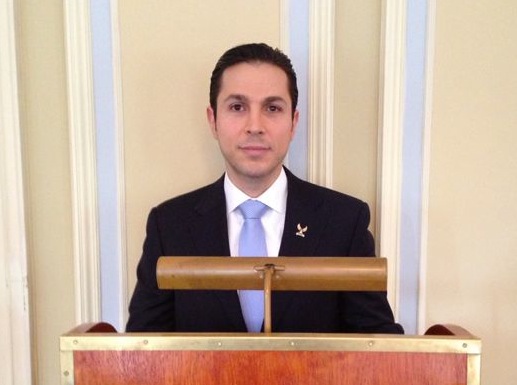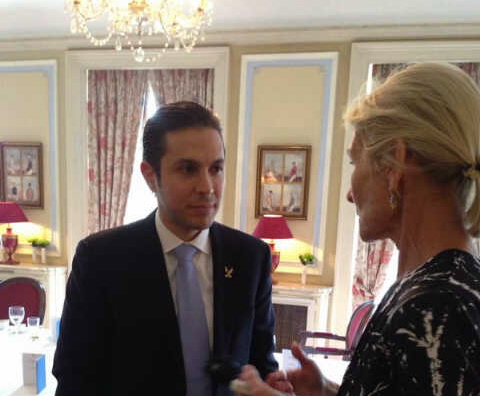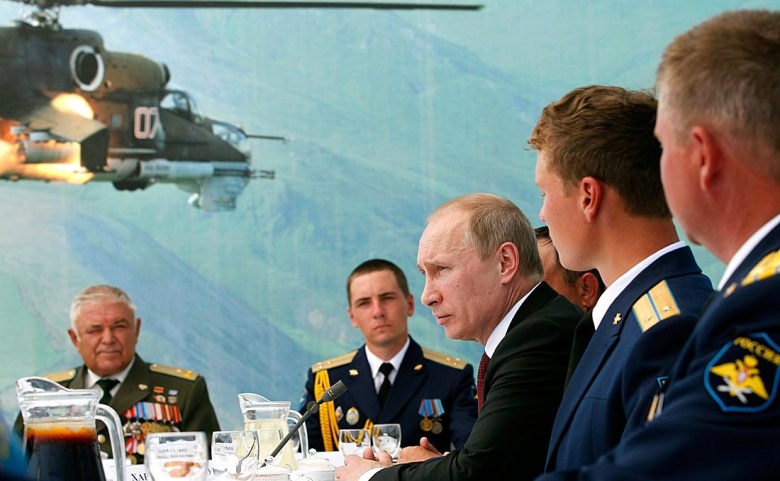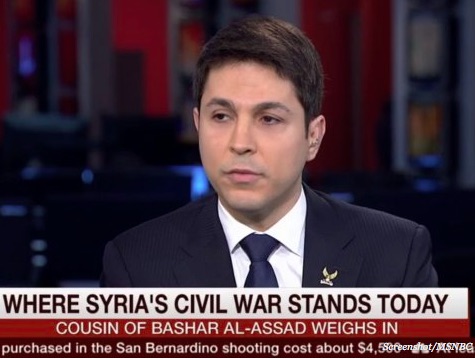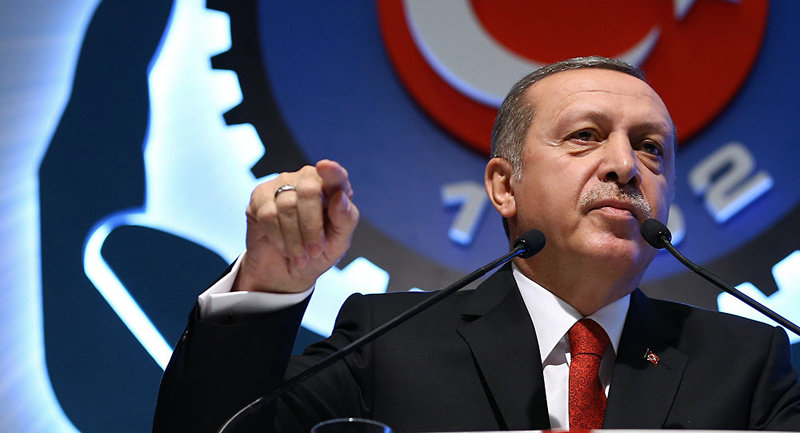ODFS Director, Ribal Al-Assad today addressed a group of business people, diplomats and journalists at The Cavalry and Guards Club in Mayfair, London.
In his speech entitled ‘Syria: What Next?’ Ribal Al-Assad said the following:
“Good afternoon and thank you for that kind welcome.
It has been over two years since I last stood here and discussed Syria.
And it will be no surprise to any of you that those two years have been disastrous and tragic for my country.
My subject today is ‘What Next’?
But to answer that question requires a great deal of context not just in terms of the Syrian conflict but regarding political and sectarian interests around the world.
Because as hard as I campaign for a democratic solution for Syria its chances remain remote whilst my country remains the pawn in a much broader series of geo-political and sectarian divisions.
I will return repeatedly to the ever-growing spectre of religious fundamentalism .
Last month’s dreadful massacres of students in north-eastern Nigeria and shoppers in Kenya and yesterday’s murder of a German diplomat in Yemen are all fundamentally linked by the cancer of extreme Islamism.
They are well-documented samples of what is taking place on a daily basis in Syria where thirteen Jihadist groups have recently proclaimed an ‘Islamist Alliance’ of tens of thousands rebel fighters. Extremism dominates the agenda across the Middle East and beyond.
In Turkey, the creeping Islamisation of Prime Minister Erdogan’s regime continues.
In Egypt Coptic Christians are being massacred by supporters of the Morsi regime that was only recently ousted. Yesterday dozens were killed in clashes between those same supporters and security forces.
In Mali, French forces had to intervene to halt the Islamist extremists’ advances against the Government – these Islamists are very well armed with weapons imported from Libya.
In Saudi Arabia and Qatar, Clerics continue to promote Jihad against Alawite, Shias, Christians and Jews in a society where there is no attempt to hide the on-going persecution of women.
In Tunisia, the government is in turmoil in conjunction with the growing influence of the Islamists.
In Libya, swathes of the country remain in a power vacuum as Islamists fight to establish strongholds with weapons originally provided by the West to bring about the downfall of the Gadaffi regime.
Prime Minsiter Ali Zeidan insists that his country could hardly be accused of “failing” mainly because “The state of Libya doesn’t exist yet”.
Instead, massive amounts of highly sensitive US military equipment from Libya has found its way into the hands of extremists reaching as far as Islamist fighters in Mali, Nigeria and Syria.
Again, I will return to the context for these regional issues.
But the threat of Islamism exists beyond the Middle East and North Africa.
In Russia, for example, the State is increasingly uneasy about the threat of extremism and keen to oppose Islamic fundamentalism elsewhere.
Hundreds of extremists from the North Caucasus region are fighting alongside the rebels inside Syria.
Russia’s preoccupation with Islamism introduces its role in the re-emergence of the cold war that has been escalating for some time now between Russia and China on one side and the US and NATO on the other.
It began with China’s perception of a US policy of encirclement and developed with Russia’s concern over the US missile shield.
During the summer, Moscow announced its “West-2013” Russian-Belarusian war games Brussels responded with its “Steadfast Jazz” operation.
Russian and US warships continue to gather close to Syrian waters. The US came extraordinarily close to intervening in Syria.
Vladimir Putin has stated categorically that he will support the Syrian regime if required.
Having acknowledged Russian delivery of S300 missiles to Syria he also announced that, “if we see international law being violated, we will reconsider our future actions, including supplies of such sensitive weapons to certain regions of the world”.
Iran was not mentioned specifically, but the link is clear. Supported by Russia, any Western resolution of her nuclear programme would become impossible. The recent meetings between the Superpowers cannot hide this tension or Russia’s long-term support for Syria her biggest client in the Middle East and her only ally on the Mediterranean coast with a Russian naval base at Tartus.
This geo-political rift can be mapped against a regional divide that has long been opening-up on sectarian lines within the Middle East.
Russia and China back a Shia-led axis running through Iran, Iraq, Syria and Lebanon.
Tehran’s politicians and military leaders have publicly claimed that they will fight to the end to save this ‘perfect’ alliance.
Sheikh Hassan Nasrallah, the head of Hezbollah, has added that he will personally fight alongside the Syrian regime if required.
As a result, Iranian troops and Hezbollah fighters have bolstered its army and affected a change in the momentum in the ground war within Syria.
Standing against them is a Sunni-led axis involving Turkey, Saudi, Jordan and Qatar, they have been supported by the US and NATO sharing an antipathy to the regime in Tehran and, as a result, have backed elements of the Syrian opposition.
Prior to his deposition, Egyptian President Mohammed Morsi, formally took sides cutting-off all ties with the Syrian regime and further inflamed sectarian tensions within his own country.
From within this axis, and ever since I last spoke here senior clerics including the Grand Mufti of Saudi Arabia (who called on all Muslims to burn Churches in the Region) have poured fuel on this growing sectarian tension by calling for Jihad against the Shiaas and Alawites.
In one instance during the summer Sheikh Youssef al-Qaradawi effectively served a death sentence on the entire Alawite sect by describing them as ‘‘more infidels than Christians and Jews’’.
It is not difficult to understand how this regional antipathy naturally hones in on Syria.
Turkey, Saudi Arabia and Qatar have long been funding, sheltering and arming the Islamist opposition and the overwhelmingly Islamist rebels.
Realistic estimates suggest that US$3.5bn has already been spent in this way.
And although it saddens me to say so the start of chemical disarmament and the potential peace conference in Geneva should not dupe us into believing that a peaceful, democratic solution beckons.
There was a chance two and a half years ago.
That was when peaceful demonstrations against a brutal regime took place as part of what was the Arab ‘Spring’ with protestors chanting for peace.
Those protestors represented a country that had, until recently, been the region’s most liberal and ethically diverse.
Sadly, the Syrian regime blunted the chances of true democracy.
But as the events of 2011 unfolded, there was an opportunity for positive change.
A democratic and inclusive opposition would have rallied mass backing.
The world was watching and the West was ready to lend its support.
A unified, representative opposition could, at that moment, with international backing have provided a real chance of change.
What happened was the hijack of this peaceful, democratic movement by a convergence of extremists.
This began with the formation of the Turkish and Qatari-backed Syrian National Council that was legitimised at the series of so-called ‘Friends of Syria’ conferences early last year.
The SNC subsequently disbanded and morphed into the Syrian National Coalition (also SNC) that was formed in Qatar earlier this year.
The SNC has, from the start been run by extremists as well as two thirds of the its 263 founder-members have all been members of the Muslim Brotherhood or its allies.
Which means that to understand the SNC one needs to understand the raison d’etre of the Brotherhood.
Because the Brotherhood is supported by a mainstream TV channel (Al Jazeera) and Turkish President Erdogan does not mean it is in any way moderate.
It is not.
It’s flag includes three key elements:
The Quran (referencing Sharia Law) two swords (referencing Jihad) and the words “and prepare” (referencing a surat in the Quran: “And prepare against them whatever you are able of power and of steeds of war by which you may terrify the enemy of Allah and your enemy and others besides them whom you do not know [but] whom Allah knows.”). Around this is written:
“Allah is our objective; the Prophet is our leader; Qur’an is our law; Jihad is our way; Dying in the name of Allah is our greatest hope.”
The Brotherhood is banned in Russia as a terrorist organisation which is unsurprising when you appreciate that its offshoots include Hamas and Al-Qaeda.
It has been implicit in much of the regional violence I mentioned earlier and it’s relationship with pluralism is best summed up by President Erdogan who described democracy in 2008 as, and I quote:
“just the train we board to reach our destination”.
This is hardly a group or a philosophy that we would expect to uphold the liberal values that we hold so dear.
And with extremist influences funding, supporting and cajoling the rebels their forces are becoming ever-more extremist.
NBC news has recently quoted Pentagon estimates that Islamist groups now constitute “more than 50 percent” of the rebel force, “and it’s growing by the day.”
General Idris of the FSA has also estimated the numbers of extremists within rebel forces at 50% as has Congressman Michael McCaul, Chairman of the House Homeland Security Committee.
A new study by the defence consultancy IHS Jane’s estimates that of 100,000 ‘opposition’ troops there are around 10,000 jihadists (including foreign fighters) linked directly to al Qaeda a further 35,000 hard-line Islamists with a purely Syrian perspective with another 30,000 belonging to groups with an “Islamic character”.
It also estimates that the total force is split into as many as 1,000 separate bands.
The overriding impression is one of chaos.
By my reckoning the proportion of rebel forces one could safely describe as ‘moderate’ can only be in the region of 20%.
The remainder share the common ground of Islamism.
In previous speeches I have documented FSA General Idris and former SNC leader, Shaikh Moaz al-Khatib ‘s support for extremism, including criticising the US for black-listing Al-Nusra as a terrorist organisation.
His complicity with extremist terror was demonstrated recently in Lattakia, where eleven Alawite villages were attacked and two hundred civilians murdered.
The groups involved were all linked to Al-Qaeda, such as the Islamic State of Iraq and Greater Syria (ISIS) , Al-Nusra , Ahrar Al-Sham ( another salafi group) and the Mujahedeen Brigade. But far from attempting to distance himself from their actions, Idris publicly announced that he was visiting “his forces” on the front line in Lattakia.
I have described previously, how the Supreme Military Council of the Free Syrian Army, exclusively comprises Salafi extremist groups, such as al-Tawhid Brigade, the Deraa al-Thawra Brigade, Suqour al-Sham Brigade, Syrian Martyrs Brigade and the al Farouq Battalions.
And how hundreds of videos show their flag flying alongside the black flag of Al-Qaeda.
But last week’s news of the formation of the “Islamist Alliance” has confirmed our worst fears.
The three largest groups previously fighting under the FSA banner announced the uniting of thirteen Islamist-jihadist groups, including Al-Nusra, calling for an Islamic State in Syria under Sharia Law.
And it comes as no surprise that they have gained support from al Qaida affiliated organisations but also from groups who a series of influential Western politicians has previously described as ‘moderate’.
Khalid Khoja, a senior SNC official in Turkey, believes that the “Islamist Alliance” now effectively control northern Syria.
And when it comes to any diplomatic progress the role of the SNC becomes even less relevant when one reads that it is not recognised by the “Islamist Alliance”.
Meanwhile, on-going calls to Jihad from across the region have accelerated an influx of imported fighters.
Western intelligence services estimate that there are now over 6,000 foreign fighters in Syria with 10 percent from Europe, Australia, and North America.
Their Arab counterparts estimate closer to 15,000, Jihadist sources speak of 30,000.
All agree that the majority have come across from Turkey, Southeast Asia, North Africa, the Middle East, and Caucasus.
In August, the Pakistani Taliban formally announced in August that it had established a presence in Syria.
Michael Morell, second-in-command of the CIA, says that more foreign fighters are now flowing into Syria each month than there were to Iraq at the height of its own war.
He believes that extreme Islamism in Syria is now the biggest threat to US National Security.
That threat can be multiplied for European countries situated so much closer to the country.
However, the biggest threat is obviously to Syrians.
This is evidenced by the stream of atrocities being carried out by Islamists.
Hundreds of women and children have been butchered from the town of Tal Abyad to Lattakia.
450 Kurdish civilians, have been murdered, as have 200 Alawites in Lattakia.
Relatively well-publicised atrocities have being committed in the ancient Christian Town of Maaloula. Christians had previously been massacred in the village of Al-Duweir in Homs. Shia groups have been killed in Hatla.
And yet, for some reason these incidents receive little coverage in the West, and no formal condemnation.
It is a sad consequence of this sub-human behaviour that it has enabled the regime to take what appears to be a principled stand against terrorism.
Last week, Syrian Foreign Minister Walid Muallem told the UN General Assembly in New York that it is not a civil war at all simply, and I quote; “a war against terrorism that recognizes no values, nor justice, nor equality, and disregards any rights or laws.”
Meanwhile, the World Tribune has published research by NATO suggesting that the rebels are so loathed and feared across much of Syria that the regime is beginning to win back the people’s hearts and minds.
It estimates 70% support.
In the North of the country, Syrian Kurds and the PYD (linked to the Turkish the PKK) are also fighting against the rebels.
As with almost every Syrian minority their interests would ideally be served by a peaceful, democratic constitution but in the meantime despite forty years of dictatorship from an iron-fisted regime that cracked down violently on peaceful protests the absence of an influential and moderate opposition means they feel safer under the leadership of the regime.
This is nothing less than a tragedy.
It also explains why we cannot say with any certainty who carried out the chemical weapon violations that almost led to Western intervention last month.
As Vladimir Putin put it ‘it would have been an odd time for the regime to use chemical weapons three days after the arrival of a UN investigation team in Damascus while the war was progressing in its favour on the ground.’
Estimates of fatalities also varied wildly, from the French number of 281, to the British estimate of 350 and finally the US estimate of 1400.
This divergence makes the atrocity no less horrific but does raise questions about their Syrian Intelligence.
One fears for the accuracy of their investigations into the source of the attack.
The US-Russian resolution on chemical weapons makes both sides accountable.
There is no doubt that the regime has stockpiles of chemical weapons.
But there is also evidence that the rebels have access to them too.
My view is that like so much of this conflict blame remains a grey area.
I also believe strongly that the days when the West equivocated over military intervention were the tensest the world has known since the Cuban Missile crisis.
Because the lethal cocktail of extremism and geo political interests mean that the conflict is constantly on the verge of exploding across the region and beyond.
I have been publically warning of the dangers of a fully-blown regional conflict ever since the start of the Arab Spring.
And sadly, the process has begun.
I began this speech with references to instances of fundamentalism across the region that have taken
place independently of Syria.
But now the war itself is beginning to pour out beyond it’s borders not just in terms of its near two million refugees but also in terms of violence.
In a throw-back to relatively recent times, black Al Qaida flags now fly above many mosques and civic buildings in Iraq’s border towns.
Iraq’s Prime Minister Nouri al-Maliki has blamed the acceleration of sectarian-led violence in his own country on weapons sent to Syria that have found their way East.
Hadi al-Amiri, Iraq’s transport minister, has added that it would be impossible to “sit idle while the Shi’ites are being attacked”.
Jordan has protested to Syria after a shell landed in the kingdom during clashes between the Syrian army and rebels.
The Lebanese army also opened fire on a van load of extremist militants who refused to stop at a checkpoint in the border town of Arsal.
Further south last week, gunmen in Egypt’s Sinai Peninsula, a hotbed of Islamist militant activity, killed three policemen and a soldier.
Meanwhile, the consequences of Turkey’s original decision to host SNC meetings and give its unequivocal support to the rebels has led to a recent change of approach.
Slowly but surely, a state of lawlessness has emerged in Turkey’s south akin to the situation in parts of Pakistan.
This has become a breeding ground for terror and there has been a measurable rise in Islamist influences towards the Syrian border.
Earlier in the year a 2kg cylinder of sarin gas was found in homes of suspected Syria Islamists detained in the southern provinces of Adana and Mersia.
They were said to be plotting an explosion within Turkey.
It now seems that al-Nusra fighters control border crossings between Turkey and Syria.
And suddenly the Turkish government is beginning to backtrack with President Abdullah Gul calling for a more robust international effort to end Syria’s civil war claiming that the global community had a responsibility not to abandon the Syrian people.
I do my best to remain objective at all times but the hypocrisy here is unbelievable.
One minute Turkey is using Syria as a strategic tool supporting her opposition and aggressively patrolling her air space.
But as soon as this policy comes back to bite she calls for help in the name of the Syrian people.
This sort of behaviour is not befitting of a country that calls itself democratic.
I could list more examples of regional inflammation, from Syrian rebels approaching the Israeli border to Syrian rockets hitting Hezbollah strongholds in South Beirut and Israeli planes attacking Damascus.
General Myers has already gone on record to categorise this as a “regional war” but we are only witnessing the ripples of the tsunami of violence that could follow.
Which brings us to the question of ‘what next’?
In terms of the Syrian conflict, there are currently only three possible outcomes.
The first is an endless war leading to the disintegration of Syria as we know it and the inevitable escalation of regional conflict.
The second is victory for the regime, whose future will rely on the support of Iran and Hezbollah.
The third is a victory for the opposition, formally represented by the Muslim Brotherhood and backed by Al Qaida.
If any of you believe that any of these is a good scenario then please speak now!
No – of course, there must be another way however distant a prospect it may seem right now.
And, as you would expect from someone speaking in the name of the ‘Organisation for Democracy and Freedom’ in Syria, I believe that democracy is the only answer.
The road to democracy begins with inclusive diplomacy.
Which means that the pending Geneva peace summit is a step in the right direction.
But only if it invites representation from every Syrian group with a genuine interest in democracy and a vested interest in the country’s future.
And that means everyone.
Sadly, democracy is not on the agenda of the Arab League nor the “Islamist Alliance”.
And whoever does represent the Syrian opposition will do so with no control of the Islamist rebels forces on the ground.
This lack of inclusion has placed a black cloud over the role of the international community since the crisis began.
Ban Ki Moon has asked for one group to represent the opposition at the conference.
Who should that be?
There is no way that any one group could possibly represent the entire spectrum of the Syrian people.
And the West must shoulder some responsibility here as its involvement has flawed from the start.
When tragic events occur in the West from the horror of 9/11 to the recent outrage in Boston, our politicians line up to point to our values and the right of every person to freedom and democracy.
But if we are to support these values in the US and Europe surely we must support them everywhere?
The long-term Western support for Saudi Arabia and Qatar takes place in full knowledge of their own human rights records.
Whilst the support for the SNC with its Muslim Brotherhood at its heart and the Free Syrian Army, despite its lack of central control and its well-documented domination by extremists is baffling.
It took Secretary of State Hilary Clinton eighteen months to change her stance on the Syrian National Council.
But rather than learn from her mistake, Secretary of State, John Kerry, has done the opposite.
Despite General Dempsey explaining that the rebel fighters “do not support our interests”, the UN’s Paulo Pinheiro stating that none of the rebel groups want democracy and Kerry himself asserting that “We can’t risk letting this country in the heart of the Middle East become hijacked by the extremists” he has given his support (and that of ten other countries) to the Supreme Military Command of the Free Syrian Army.
Even more worryingly, considering the intelligence available all over the internet, when Kerry was asked during the congressional debates:
“Is there any Al-Qaeda in Syria? There are reports they have been growing stronger.”
He replied: “No. I say with all responsibility: there is no Al-Qaeda there”.
Even President Obama referred this summer to the ‘moderation’ of the rebels.
One can only assume that these influential men have been very poorly briefed.
There was absolutely nothing about the “Islamist Alliance” ’s recent statement that suggested moderation!
Until these men publically denounce the Islamist nature of the majority of rebels and put a plan in place to promote every group with a real interest in the long-term welfare of Syria and her people peace talks can only fail.
Russia and the US’ recent hand-holding may only be superficial but one hopes it is because the West is beginning to understand that it can no longer back the rebels.
In the current climate a ceasefire could not hold.
And a peaceful election would be a pipedream.
Tens of thousands of Jihadists are simply not going to pack their bags and disappear.
And so while the situation remains so flammable on the ground Russia, the United States and the international community should agree to stop supplying any group with money, arms or supplies and must pressurise Turkey, Saudi, Qatar and Jordan to stop funding, arming, training, sheltering and encouraging the rebels.
Financial assistance should only be used to supply medical aid through the Red Cross, UNICEF and other responsible charities.
It should save civilian lives rather than compromise them.
In the meantime, I remain exiled from my own country.
I remain abhorrent of a regime whose tyranny and violence have been inexcusable.
I pine for peace and for a unified, representative, democratic opposition to whom I could offer my support.
Sadly, there is not.
And in the current climate as a lover of Syria and the Middle East I can only side with Henry Kissinger, that titan of international relations who said recently that:
“The biggest risk to the region is Radical Islam”.
Thank you”
